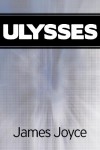Currently reading
Decent summer read for Anglophiles
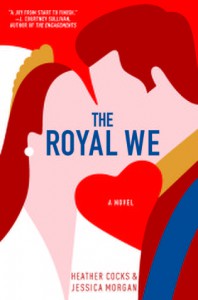
I'm not really sure how I feel about this book. It's the story of American girl Bex Porter, who goes to Oxford and lives on the same hall as the future king of England. They meet cute, fall in love, break up, make up and eventually find themselves preparing for the wedding of the century while battling the press, the royal family, and a sometimes disobedient entourage.
The authors are the Go Fug Yourself ladies, who are sometimes hilarious and sometimes TL;DR. The same is true of the book--it covers almost a decade, so the length sort of makes sense, but big sections in the middle just drag and drag and when I finished I did not feel proud of myself for having just read nearly 500 pages of thinly disguised Will and Kate fan fiction.
The ending also felt a bit flat, probably because Will--I mean, Prince Nicholas--is offstage for about a third of the book. You see what brings Bex and Nick together in the beginning, but it wasn't quite enough to keep me rooting for them at the end.
 1
1
Why would you make up such boring stories?

Primates of Park Avenue is one woman's memoir about moving to the famously wealthy Upper East Side after her first child is born. As she mentions every few pages, just to make sure you never forget, the author has a Ph.D. in cultural studies (FROM YALE!!! YAAAALE!) which means she tells the story as though it's an anthropological study, comparing the people of the UES to various primate groups around the world.
There is a clear hook here--who doesn't enjoy hearing gossip about the rich and the ways they (mis)manage their incredibly privileged lives? The problem is that Martin tries to paint herself as an outsider who's only joining the mean girls for the sake of her son when it's obvious that she badly wants to belong to the group she's bitching about and in fact has all of the superficial trappings one needs to fit in: wealth, designer clothes, conventional attractiveness, and family members in the neighborhood who can help pave her way.
Some of Martin's struggles as she desperately tries to join this new tribe:
1. She buys (or rather, her husband buys for her--is this her "wife bonus"?) a Birkin. An entire chapter is dedicated to her love for and eventual acquisition of a notoriously overpriced bag. To the reader's great sadness, she's unable to get one in her first choice of color, but it's still fancy enough for her to rub in the face of an underpaid sales clerk (she actually does this).
2. Before she Birkins up, she is literally charged and run off the sidewalk by an older woman wearing a fancy handbag. I'm sorry, does anyone believe this story actually happened, especially given the other factual inaccuracies that have come to light about the book? (The author's name isn't really Wednesday, for starters--it's Wendy.)
3. To lose her baby weight, which wasn't very much because she got horribly ill during pregnancy and was actually the envy of her UES friends for her gaunt frame, she becomes obsessed with ballet barre workout classes. Apparently these are much different from Soul Cycle workout classes, and the people who go to each class are like warring factions. There's another chapter or so spent on this and it is excruciatingly boring. Dear Wendy: nobody cares about your dreams unless they're in them, and nobody cares about your workout/diet unless they're doing the same one.
4. She can't get any of the snobby women at her son's snobby pre-k to set up play dates with her son. Her sister-in-law's children went to the same school and presumably she could have introduced her around, but instead of discussing this possibility at all Wendy cleverly flirts with an "alpha male" at a school function so that he invites her kid to play with his. It is important to preserve the narrative that all women in this group are cutthroat to outsiders although I admittedly would not go out of my way for a sister-in-law who acted like the author and would probably be embarrassed to introduce her to my friends. So I guess that anecdote makes more sense than I originally thought.
The most baffling thing about this book, which appears to be chock full of inaccuracies ranging from the number of years actually spent in the UES to the number of children she had during her time there to her actual name, is that she would put so much effort into making things up without inventing a single anecdote that's funny or interesting.
 1
1
Blergh
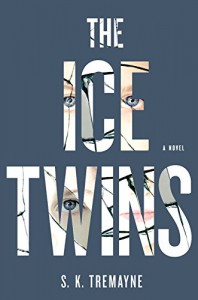
I really wish I'd liked this book as much as everyone else seems to. It's about a couple whose relationship hits the skids after one of their identical twins dies in an accident. Tension builds as the couple moves to a rundown house on a remote Scottish island and their surviving daughter tells them they made a terrible mistake about which twin died.
1. If somebody finds a key to a chest full of secrets, that person should uncover all of the secrets at the same time. Leaving one last drawer to be gone through at the book's climax is shitty writing.
2. I really could have done without the photos of what appears to be the author's vacation house. One gets the impression that there's a patch of Scotland that's important to him and that he loves well, but if that's the case he should be able to describe it vividly instead of relying on photos as a crutch.
3. The ending read as misogynistic to me.
(show spoiler)
I won't be reading other books by this author.
 1
1
The Firebird
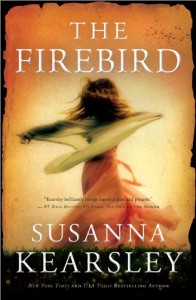
My third Susanna Kearsley book of the year--I think I need to space her novels out, as they're all very similar and I might have enjoyed this one more if I hadn't read some of her other books a few weeks ago.
The Firebird tells the story of a modern pair of psychics, Nicola and Rob, who work together to uncover the story of a Jacobite woman named Anna and her connection to a rare Russian artifact. Kearsley always ties her historical novels in with something modern and paranormal. In this instance, I really wish she'd left out Nicola and Rob altogether. They seem like lovely people, but their chapters weren't particularly compelling. We're talking two people who take something as exciting as a trip to Russia and turn it into a tedious round of eating at the same restaurant, talking about Anna, and wandering around in a daze as they psychically watch her story unfold.
Anna's story, while bogged down with more than a few boring chapters, was more compelling. Still, she's a typical Kearsley version of the Mary Sue: lovely to look at, kind, spunky, and, somehow--although ostensibly a poor orphan--the beloved center of everyone's lives. She dances well, she sews beautifully, and she speaks Russian like a dream. Every single person she encounters is impressed with her except for the villain.
I added half a star to my rating because I did like the ending of this book quite a bit, but overall I thought it was quite boring and I'm glad it's over.
A touch of boredom
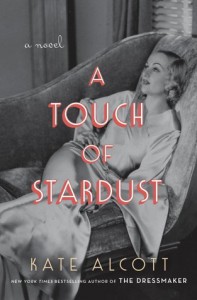
A Touch of Stardust is the latest in a long line of books that wouldn't have been published if they didn't center on the lives of famous people. I picked this one up because I'm a sucker for Old Hollywood and had a thing for Gone With the Wind when I was a kid. It moves quickly and before I knew it I was halfway through, which meant I was going to finish it. I wish I hadn't.
The plot is thin. The heroine grows and changes a little, but not much. Old gossip from the GWTW set is rehashed; the names of long-dead actors are dropped. Take away the backdrop and the celebrities and this book would be a pile of dusty pages languishing in the author's desk, unread and unmissed.
Anne Perry: sociopath or just cold?

This Anne Perry bio was written with Perry's cooperation, and boy does it show. The author is extraordinarily sympathetic. For those who don't know, Anne Perry was born Juliet Hulme and, at 15, helped to murder her best friend's mother.
Perry is now a devout Mormon and claims to have repented for her sins, but whenever she talks about the crime she's full of excuses as to why she's not really to blame for what happened: she thought her friend was suicidal; she felt pressured; the TB drugs (that she'd quit taking months before the crime happened) affected her thinking, etc. She denies being a lesbian, yet has a female life partner. Apparently she is the type of person who looks you in the eye and tells you things in an authoritative voice and expects you to accept them without questioning her.
The author of this biography certainly accepts things at face value. She spent about a week interviewing Perry and it appears to have been the softly lit, ass-kissy kind of conversation that Oprah does when she's chatting up celebrities. She doesn't get into the details of Perry's crime until about a third of the way into the book. A lot of the information we get about Perry comes directly from people who have a business relationship with her, which is ridiculous--how honest are you going to be when asked about your meal ticket? How well do you really know someone that you deal with professionally?
The book is full of business emails that go into excruciating detail about Perry's advances and book deals, and at least a hundred pages are devoted to summarizing Perry's many novels. This is supposed to offer insight into her character because she writes lurid murder mysteries and likes to go back to themes of redemption and forgiveness in her writing. I have read a couple of her books and I agree that she writes from the position of one who wants to be accepted despite what she's done. The overwhelming sense one feels after reading her books, though, is that she's a cold person who views death as a puzzle, not a tragedy. Some of the creepier quotes taken from the books--like one saying how easy it is to bash someone over the head if they trust you--are presented without judgment.
I have read other books about Parker/Hulme, and I watched the documentary that came out about Anne Perry a few years ago (Anne Perry: Interiors) and she simply does not seem to be someone who truly feels sorry for what she's done. Sorry she was caught, and sorry that people keep asking her about the crime? Yes.
This is not the book to turn to if you're interested in learning about Anne Perry's character or private life. Do pick it up if you enjoy publishing insider info or spoiler-filled synopses of murder mysteries.
Fun with reincarnation
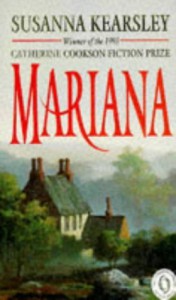
If you're not familiar with Susanna Kearsley, she writes the kind of books you want to read on a rainy day with a cup of tea. In this one, a book illustrator buys an old house that she's mysteriously drawn to and gets sucked into a reincarnation mystery. The heroine isn't too quick on the uptake, but she figures everything out eventually. This is one of my favorite Kearsley novels, although I can't pinpoint anything that makes it stand out from her other books. The author has a serious obsession with Jacobites, paranormal/historical mysteries, and Scotsmen.
There was one really jarring element to the book, though, which I wish I could have avoided.
TRIGGER WARNING AND SPOILER:
(show spoiler)I hate hotels

Heads in Beds is supposed to be the Kitchen Confidential of the hotel world, full of tips on how to get upgrades and what not to say to bellmen and the people who check you in. Meh. I guess I don't travel enough to care about what hotel staff are really thinking. I always use the U-Scan at the grocery store and would be happy with a totally self-check hotel where you cut your own keys and haul your own bags. If you're interested in learning how to slip the front desk guy $20 or $100 for a "free" upgrade or bottle of wine, then this is the book for you.
Tobey Maguire is basically evil

This book sucks. It's boring and poorly written, and the author sounds like an idiot. She goes on at length about how she protects her business by making herself "indispensable" to the men who play her game, yet she has the game taken away from her multiple times. If I hadn't had insomnia last night, I would not have bothered finishing it.
She name drops repeatedly. One tidbit of minor interest: Tobey Maguire is a greedy jerk (at least according to the greedy jerk who wrote Molly's Game). Can't say I'm surprised.
On a positive note, this book has inspired me to make a belated New Year's resolution to read less crap in 2015.
Yeah, I'm obsessed with Sylvia Plath. No Shame.

As the title of this book implies, Sylvia Plath in Devon: A Year's Turning focuses on the time Plath spent at Court Green, her house in Devon. It includes a short memoir by Elizabeth Sigmund, who was Plath's friend at the end of her life. Sigmund also lived in Court Green for a brief period after Plath's death and knew Plath's husband, Ted Hughes, and the woman who came between them, Assia Wevill.
The majority of the book is a kind of expanded timeline of Plath's life at Court Green: dates of parties attended, snippets of letters and journal entries, an overview of which poems were written when. This section ends abruptly when Plath moves to London. The book is further padded with a tedious introduction by Plath's posthumous stalker Peter K. Steinberg, and a rather lovely essay about a poem Sigmund wrote in Plath's memory. I'd read the essay before when an earlier version of it was published online, but it was worth re-reading.
So, now that I've finished reading the book I'm a bit conflicted. Who is this for? What is its purpose? It's short (less than 100 pages, according to Amazon), and expensive ($10 on Kindle) and there's nothing particularly noteworthy here. I do like Crowther's writing style and would be interested in reading more of her work, but I hope any books she publishes in the future are a bit meatier.
Yikes

Skylar Neese was brutally murdered by her best friends, and nobody really knows why. This book presents a sexual motive, but it's hard to trust the authors because of the way they speculate about events. It's also terribly written and so badly formatted (possibly because I read it on Kindle) that I found myself frequently paging backwards to see if I'd missed a paragraph.
Things jump around so much that it's actually hard to follow the chain of events: finding the timeline at the back of the book helped to clear up some nagging questions I had as I read. The authors also drop a couple of plots: they imply that something mysterious came to light after investigators seized Shelia Eddy's car but don't follow up with any forensic evidence, and they also go on at length about various Facebook groups that spread lies and innuendo without bringing any closure to those threads. Did Skylar's family confront the distant relatives who ran the Facebook page that accused them of lying? Did other people turn against them after the girls were convicted? Does anyone know how Jennifer Hunt or the anonymous tweeters got their information? Speaking of tweeting, the analysis given here of the girls' tweets was embarrassing. Ask your 90-year-old grandpa to explain to you how email works and you'll get a taste of the "old folks jabbering about kids today" air of the book.
I can't recommend this book to anyone. If you want to learn more about the case you'd be better off watching the Dateline episode or reading articles online. I wish I'd stopped there and not started slogging through this horribly written nonsense. Skylar and the people who care about her deserve better than this book.
Murders, Detroit, etc.
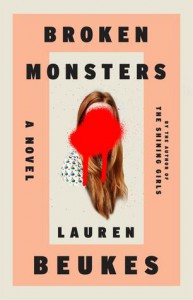
So I read an earlier book by this author, The Shining Girls, which was superficially quite similar to this one (gross thriller with paranormal overtones peppered with Britishisms that somebody should have edited out).
I liked The Shining Girls a little more because it was more suspenseful and the paranormal bits were handled better. Here, they felt kind of half baked and were the worst, most tedious part of the story. Reading the finale I kept thinking that this was going to make a really cool-looking movie one day, but as a reader I was just not interested in any of it. Actual serial killers, cops who imagine murdering someone and arranging the scene so they'll get away with it, sexual assaults shared on social media as though they're funny--all of those things are scarier than whatever the hell was behind the doors in this book.
Which I guess leads me to my main complaint about the story: it wasn't scary, or suspenseful. It was gross and grim. It was a little bloated, and I don't think it had anything terribly new or interesting to say. In fact, some of the characters are giant stereotypes and I cringed a bit as I read. I might check out the author's books that are set in South Africa, though, to see how she handles a setting that she's lived in.
French cheese
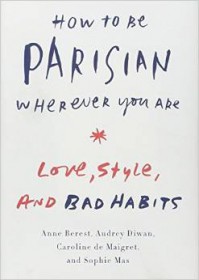
I keep hoping that I'll outgrow this phase of wanting to read about French women, but so far it hasn't happened. Apparently I'm not alone.
This one doesn't stand out in the crowd of books about how French women dress, smell, age, cook, eat, love, and parent. It consists primarily of lists interspersed with pictures of lovely women and would be a good gift for the college student who can't stop talking about her semester in Paris or the work friend who spends entirely too much money at Anthropologie.



